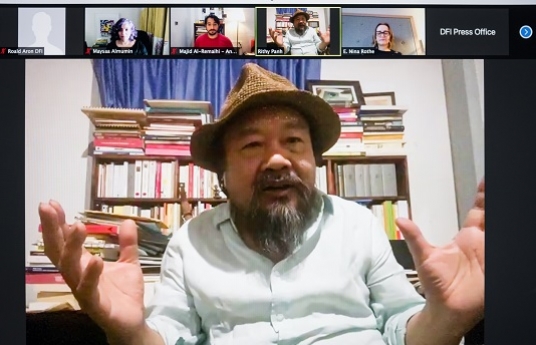Making film in the time of pandemic: Lessons from Doha
Mar 13, 2021

- Mentored by acclaimed Cambodian-French filmmaker Rithy Panh, projects by emerging filmmakers from Qatar and the region evolved from the Doha Film Institute’s Short Documentary Lab despite the pandemic
Doha, Qatar; March 13, 2021: It was a new experience for all: Making films despite lockdowns and pandemic protocols. What we learned was that what mattered was the will to learn and to keep the passion for cinema alive.
The triumph of three young filmmakers in making cinema amidst the pandemic, under the mentorship of Oscar-nominated Cambodian-French creative documentarian Rithy Panh, was highlighted on the opening day of Qumra 2021, Doha Film Institute’s annual talent incubator for Arab cinema.
Addressing the media, Rithy Panh commented, ultimately, making cinema is about looking into yourself, your past, our future, the world around us and our memories. “All your stories are inside your body,” said Rithy, who tutored filmmakers as part of DFI’s Short Documentary Lab. The sessions were virtual, including group discussions and several one-on-one sessions. He said the external challenges do not limit your ability to “narrate your story or point of view.”
Joining him were the directors of the documentaries selected for the Doc Lab: Majid Al-Remaihi (And Then They Burn the Sea – Qatar/Arabic, English/2021); Maysaa Almumin (…And I Was Left Behind – Qatar, Kuwait/Arabic/2021); and Suzannah Mirghani (Virtual Voice – Qatar, Sudan/English/2021).
The overarching sentiment of the directors was that the experience of making the films during the pandemic made them more self-reliant. Despite the lack of crew and other support systems, they said the sessions with Rithy helped them finetune their work, especially as they looked further inward to find solutions for their creative challenges.
Al-Remaihi said his documentary was an extension of what he was doing at the Doc Lab, which he was attending for the third time. He said the key learning from Rithy, “vague and cliched, as it may sound, is to trust your intuition. The confidence as a director is not something you earn at once. It is a process. The tonality and positioning also do not come in an instantly; you need to act on it and continue to affirm it, which is something I learnt – and continue to learn – from Rithy. The Doc Lab new what was needed in terms of a toolkit and helped us in achieving our vision and the direction we were exploring.”
Filmed on an abandoned fishermen village of Northern Qatar, his film, And Then They Burn the Sea is an ode to the filmmaker’s living mother whose memories abruptly left her during the making of the film. It mirrors a history of maternal mourning rituals that lament their loved ones who may never be returned by the sea.
Mirghani said the experience of making her documentary was totally different as it is “technically made online. Mine is the quintessential quarantine film, and I was inspired by the films Rithy showed.” She said that working remotely had its pros and cons. “While we missed the closeness of having your cast and crew, [we must realise] this is the reality. We have adapted, learnt new skills, particularly the skill of relying on yourself. And we had all the help we needed. The lab changed my traditional idea of documentaries, and what my documentary tries to explore is how we are as humans because we are socially distant.”
Shot entirely on a mobile phone or through Zoom, her short Virtual Voice is a digital satire in which Suzi doll is an ego-warrior. A next-generation activist avatar, marching to the algorithms of social media, she is lit by temporary outrage. She copies and pastes and forwards blame that are sometimes uplifting and sometimes bandwagon bullying.
Almumin said the strange, unusual circumstances “called for us to be innovative and creative. I don’t think I have had so much control over my film as I had now, and by doing things oneself, comes self-reliance, which leads to a learning curve. There is a lot more ownership to my film. It was wonderful to be a student once again, and it was great to make a film exactly like a designer.”
Her film, And I Was Left Behind emerged from the lockdowns following the pandemic. In her note, Almumin observed: “Physical distance became unbearable during the travel band, as was the uncertainty of when and if we would ever see each other again. Unable to bid goodbye to relatives who succumbed to the coronavirus brought back memories of my grandmother telling us stories of family members who travelled, never to be seen again, the perils of travel and the emotional pain she endured.”
Rithy Panh has directed several internationally acclaimed films, including The Rice People, which was selected for the Official Competition of the Festival de Cannes in 1994; The Land of Wandering Souls (2000), which won several awards. In 2013, Panh directed The Missing Picture, which was nominated for the Academy Award for Best Foreign Language Film and won the Grand Prix in the Un Certain Regard section at the Festival de Cannes. He is a principal founder of the Cambodian Film Commission, an industry development organisation that includes the CFC Film Lab, a professional film training programme for Cambodians.
Public can access Qumra online by purchasing a Qumra Pass that offers the full Qumra Screenings and Qumra Talks programmes. Qumra Pass is open to all citizens and residents of Qatar and the MENA region, and applications will be processed on a first-come first-serve basis. The Qumra Pass is priced at QAR 500; students and Culture Pass by Qatar Museums holders can purchase it for a discounted price of QAR 350.